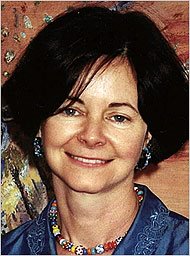 Geraldine Brooks has been named as this year's recipient of the Pulitzer prize for Fiction with her novel March, The Age reports.
Geraldine Brooks has been named as this year's recipient of the Pulitzer prize for Fiction with her novel March, The Age reports.Taking Louisa May Alcott's Little Women as her starting point, she tells the story of the girls' largely absent father and his involvement in the American Civil War. Brooks based much of the story on the journals and letters of Bronson Alcott, Louisa May's father, and was inspired to write the novel by the reminders of the war she saw around her when she moved to rural Virginia:
There were bullet holes in the bricks of the local church where a Civil War skirmish had taken place; a Union soldiers belt buckle was unearthed in our backyard. Thinking about the young man who had worn that buckle was the beginning, in my mind, of March.Brooks was born in 1955 in Sydney (she holds dual nationality) and began writing as a reporter on The Sydney Morning Herald. She later worked as a foreign correspondent, mostly for The Wall Street Journal, covering crises in the Middle East, Africa and Bosnia. She has written non-fiction, including Nine Parts of Desire: The Hidden World of Muslim Women. Her previous novel Year of Wonders, is set in 17th-century England, where the plague strikes a small village. It became an international bestseller
Much more about her here,and hear her in interview with Jane Holroyd at The Sydney Morning Herald.
It's been a great year for Australian writers with Kate Grenville winning the Commonwealth Writers' Prize.
Related Post:
Prequels, Sequels and More-quels (12/5/05)
6 comments:
I have read "Nine Parts of Desire" and "Year of Wonders" and enjoyed both immensely. I would love to read "March" but the subject matter(the American Civil War) doesn't quite grab me. However, I will not dismiss it until I read a few reviews by regular readers like myself.
How could this be??? It IS technically a FANFIC! Well, there goes those people who continues condemning writers who build on pre-existing works.
Saw the book on sale for less than ten dollars in Perth city, might buy it. Might. Speaking of Pulitzer, I've just finished reading Adventures of Kavalier and Clay, great book. Currently discovering the joys of Gabriel Garcia Marquez's Love In The Time Of Cholera.
Hm, just found out that free membership in librarything.com only allows 200 books to be shown, that's a bummer.
A contemporary author I should have considered before now. I've really (I mean *really*) valued the Pulitzer since Jhumpa Lahiri got the fiction prize in 2000.
Lotus Reads - i haven't yet read any of her books - time for a voyage of discovery!
swifty - the full membership of Library thing is actually worth it! am getting more addicted as time goes by and it makes me look at the books on my shelves in different ways
"fan fic"? yes i guess it is in a way ... i wrote about the phonomena before and have added a link to the post
hadn't heard of "the amazing adventures of kavalier and clay" you mentioned but found it at amazon and it sounds very interesting
walker - love jhumpa lahiri - one of the best short story writers.
Yeah, Justin and I were involved in a rather lengthy debate/exchange with some published authors regarding the merits of fanfiction. Some authors like Robin Hobb tend to think that fanfiction is disrespectful towards her work, because her creations are used by those fans for stories of their own, she even veered towards condemning these people for being unoriginal enough to come up with their own ideas. Saying stuff like singing at the karaoke won't even make you a great recording artiste, and all kinds of ridiculous nonsense like that.
For me, I just think of fanfiction as a form of 'open source' community. As long as fans are allowed to write their own stories regarding characters they like, I'm sure it also works well as extra publicity and promotion for the original works. That's why I can never see why some authors are so desperate to condemn the very existence of fanfiction, or fanfic-writing, when the likes of Neil Gaiman and Geraldine Brooks are writing 'fanfics' using characters and settings not originated from themselves. The only difference is that Gaiman and Brooks got to be published, whilst the rest could only post their works online. Hmmm.
Anyway, if you are interested in this debate, you can check out this article by Justin last year. Pretty intense stuff. Haha.
Swifty - Implicit in this is the assumption that an author somehow owns their 'characters and world' to the extent that no one else is allowed to play with them. But why? Once you publish work, it enters into the public arena. People begin to engage with it. It becomes the property of the readers.
Yes, I'd agree with Justin here.
Post a Comment